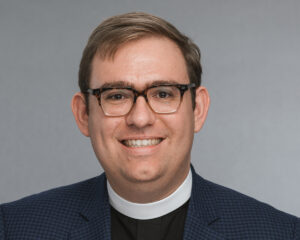 Trinity has a long tradition of being served by professional church musicians. Despite this continued emphasis, as you peruse old annual reports and yellowed bulletins, you’ll note a trend: with each new leader, we’ve also gotten a new title.
Trinity has a long tradition of being served by professional church musicians. Despite this continued emphasis, as you peruse old annual reports and yellowed bulletins, you’ll note a trend: with each new leader, we’ve also gotten a new title.
As Dr. Cameron Wentz begins his time at Trinity, you may have noticed that some folks have already begun to refer to him by his title of “Cantor”. This is not entirely foreign to Trinity, but it deserves comment on account of its deeper meaning. Indeed, this tradition and our unique understanding of the role has led to its wider use in the ELCA and in Europe.
The title “Cantor” is rooted in our musical and theological traditions. Originating from the Latin word cantare, meaning “to sing,” the title speaks to the Cantor’s role as the leader of our song, charged with shaping and guiding the congregation’s musical expression in worship.
Martin Luther, himself a musician and ardent proponent of congregational singing, held the Cantor’s role in high esteem. For Luther, music was not merely an addition to worship but a profound gift that communicates the message of the gospel and stirs the heart. By placing music at the center of our worship, Luther transformed the congregation’s musician from hired hand into a partner in ministry and a theological educator, responsible for selecting hymns and music that conveyed the beliefs of the church.
Historically, the role of Cantor was most famously seen in Johann Sebastian Bach, who served as Cantor at St Thomas’ Church in Leipzig. Bach’s responsibilities extended far beyond leading music; he composed, rehearsed, and directed music for worship and was involved in educating students.
The role holds a pastoral dimension as well, caring for the members of the ensembles and sharing moments of prayer and care with them. This became possible because of Luther’s radical vision of the “priesthood of all the baptized,” wherein every Christian could serve as a channel for the saving message of the gospel, not just members of the clergy.
In the historic Lutheran context, then, the Cantor is a steward of worship, a cultivator of the church’s musical and liturgical life, and a bridge between theology and art. The role is not limited to music but extended to creating and feeding a faithful, worshiping community. In this sense, the title “Cantor” carries with it a legacy of spiritual leadership, educational responsibility, and artistic devotion—reflecting Lutheranism’s deep reverence for the place of music in the life of faith.
As we welcome Cameron and bestow on him this title, we do so in order to properly place him in the Church’s historic tradition and also in the long line of faithful musicians who have formed our congregation’s life through music, worship, and art. Even if they have not all held this title, they have contributed to the richness of our musical life here. In that way, they are successors not only to their predecessor, but to Luther and Schütz and Bach.
Pastor Hans


